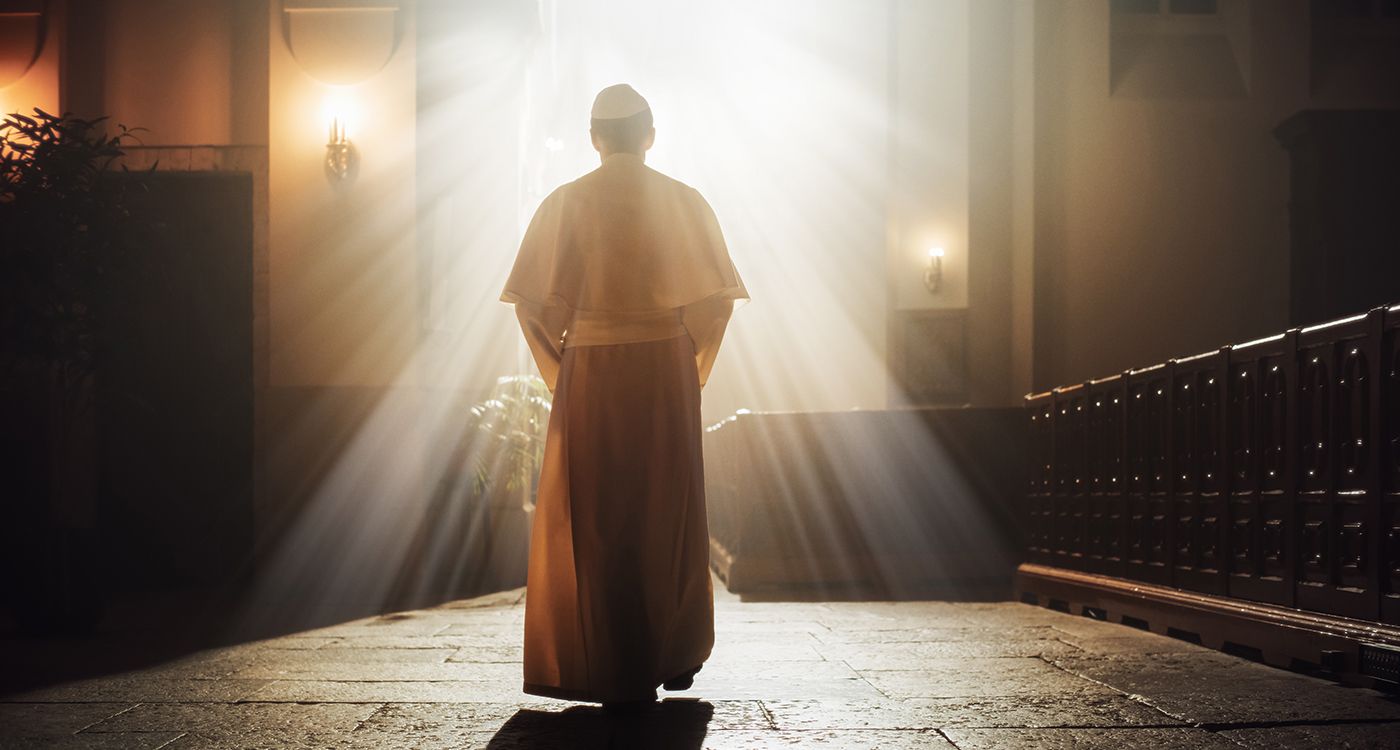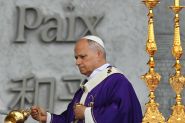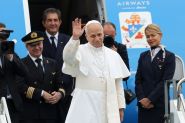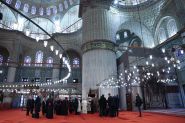- Home
- Middle East
- Papal Election and Contemporary Challenges

©shutterstock
The election of Robert Francis Prevost as bishop of Rome is a powerful indicator of the Catholic Church's ability to reform its bi-millennial odyssey and reinterpret its ecclesiology to make it adjust to the challenges of contemporary ministries in a global world. The changing of the theological and ecclesiological paradigms is a Church history constant that was abundantly documented throughout the bi-millennial: starting with the founding kerygma (faith proclamation) and its intertextual references (the Hebraic Bible in its first and second testaments) and various hermeneutical interpretations (Greek and Latin philosophy, the Church Fathers writings—Greek, Latin, Syriac, Coptic, Armenian…); the Medieval scholastics; the Protestant Reformation and its antecedents; the Counter-reformation, the Aufklärung and the Romantic narratives; the contemporary deconstructionism and the post-metaphysical theology, and their incidence on the understanding and practice of Church ministries.
The seven councils around which the various churches unite resulted from systematic theological elaboration upon which they draw in their pastoral work. The very notion of church is ecumenical by definition on account of its civilizational and cultural pluralism, missionary nature and universality. “As the Father sent Me, I am also sending you. Go into all the world and preach the gospel to all creation” (Mark 16:15). “They were all filled with the Holy Spirit, and they began to speak different languages” (Acts 2:4-28).
The dialectical relationship between Gospel universalism and its various ecclesiological modulations has changed over time, and doctrinal consensuses have been shaped and reshaped throughout history by the intellectual work of the Church Fathers, various theological traditions and Church ministries that reflected the historical idiosyncrasies of the individual churches.
The Church of Rome, which counts among the various historical churches, has enjoyed a certain primacy since it is the See of St. Peter, which was entrusted by Jesus. Jesus asks his disciples, “Who do you say I am?” (Matthew, 16:15). Peter answers, “You are the Messiah, the Son of the living God,” to which Jesus replies, “Blessed are you, Simon son of Jonah, for this was not revealed to you by flesh and blood, but by my Father in heaven. And I tell you that you are Peter, and on this rock I will build my church…” (Matthew 16:17-18). This statement is a foundational proclamation.
The primacy of the Church of Rome is kerygmatic and should not be confounded with accidental historical features. The federating status of the Church of Rome is definitional, despite the fluctuating fortunes and historical prevarications of the Roman See. Otherwise, the Church of Rome, like other churches in their own right, has played a pivotal role in the formation of European civilization and its normative, cultural and political identity. One cannot understand medieval, modern and contemporary Europe without relating it to the foundational role of the Church of Rome (political configurations, legal traditions, philosophical and theological traditions, educational systems, universities, geopolitics, artistic, literary and scientific traditions, social and economic systems and ministries…).
It’s no surprise that the contemporary papacy elicits such an interest, despite the systemic flaws of the clerical system and its drawbacks. The papacy and the Catholic Church have a federating role within the West and the global ecumene. This is amply highlighted through the late decades, whereby the modern Church plays a major role in international social, economic and educational development, conflict mediation, the promotion of professional and ecological ethics and awareness, interreligious dialogue and the defense of international human rights and justice.
The death of Pope Francis was a time of profound introspection elicited by his global ministry of compassion, empathy, justice and ecological wholesomeness, and so is the inquisitiveness around the election of Robert Francis Prevost as bishop of Rome. The Church of Rome has played a pivotal role in the formation of the European idea and its materialization, the formation of its nation-states and the building of the international federating orders and institutions. We have to recall the names of Popes Leo XIII (1878-1903), Benedict XV (1914-1922), Pius XI (1922-1939), Pius XII (1939-1958) (however controversial), John XIII (1958-1963), Paul VI (1963-1978), John Paul II (1978-2005), Benedict XVI (2005-2013) and Francis (2013-2025) to understand the central role of the papacy in the highly tormented 20th and 21st centuries.
The election of US-Peruvian Pope Robert Francis Prevost is a continuation of the dynamics engineered by the Vatican II council, its inclusive synodality and the innovative theological embedding of contemporary ecclesiology (paradigmatic shifts, Hans Küng, Karl Rahner, Yves Congar, Henri de Lubac, Edward Schillebeeckx, Avery Dulles, David Tracy…). Pope Leo XIV had already defined his intellectual genealogy when he chose the name of Leo as a successor of Pope Leo XIII, who pioneered a new pastoral tradition impelled by the structural transformations of the industrial age and its legacy of economic, social and normative dislocations.
The role of the Catholic Church was central to the definition of the reformist social and economic policies of the modern age and the institutionalization of the developmental concerns at the core of international politics and economics. Its input was essential in the fields of economic justice, ecology and developmental ministries throughout the world. Aside from intellectual genealogy, the ministry of Pope Leo was spent in various missionary assignments in his homeland and his adoptive land, Peru, as the president of the Pontifical Commission for Latin America (2023-2025), parish priest, educator and bishop of Sufar and Chiclayo (2014-2015, 2015-2023) dioceses. Otherwise, his long tenure as the prior general of the Order of St. Augustine (2001-2013), the prefect of the bishops' dicastery in Rome (2023-2025) and his appointment as a cardinal deacon in 2023 were the established credentials that made the college of cardinals elect him as the 267th successor of Peter.
Moreover, his deep spirituality, meekness, compassionate character and well-honed missionary and pastoral skills displayed throughout his various ministries have prepared him for the papal ministry. He is a true pontiff since he spent his life as a servant and a bridge builder between continents, cultures and human realities. His choice by Pope Francis was not an arbitrary one, he was one of those who were groomed to lead the papacy in this era of profound transformations.
Pope Leo XIV's vast worksite includes major Church reforms: reforming the ministries, pursuing the theological reflection in sync with the major anthropological transformations elicited by the scientific and philosophical worldviews of late modernity and their incidence on Church ministries, refining the modulations of synodality, addressing the systemic issues of sexual and financial delinquency, and redefining the scope and the questions of peace, social and environmental justice, education and health ministries, and the ethics and politics of difference and their incidence on Church ministries…
The beauty of the Roman liturgy that we attended lately was a metaphor for this deep quest for meaning in a world where reification has engulfed the lives of individuals and societies: “There are contexts where it's not easy to preach the Gospel and bear witness to its truth. There are settings where other securities are preferred, like technology, money, success, power or pleasure. Believers are mocked, opposed, despised or, at best, tolerated and pitied. Yet, precisely for this reason, they are the places where our missionary work is desperately needed. Pope Leo continues, “A lack of faith is often tragically accompanied by the loss of the meaning in life, the neglect of mercy, appalling violation of human dignity, the crisis of the family and so many other wounds that afflict our society” (Pope Leo's first homily as a pope, May 9, 2025).
The death of Pope Francis and the election of Pope Leo XIV are quite symptomatic of these deep yearnings and the spiritual tradition that vehicles them. The ministry of Pope Francis and the incoming ministry of Pope Leo are echoing each other and setting the tone for another innovative ministry, recapitulating the missionary narratives of an Augustinian relaying those of the Jesuit and their contextual embeddings.
In his first address after the election, Pope Leo XIV greeted St. Peter’s congregation with a warm wish, “Peace be with all of you!” “Dearest brothers and sisters, this is the first greeting of the Risen Christ, the good shepherd who gave his life for God's flock. I, too, would like this greeting of peace to enter your hearts, to reach your families and all of the people, wherever they are, all of the people all over the earth.” (May 8, 2025). The mass has ended. Go into the world to love and serve.
Read more




Comments